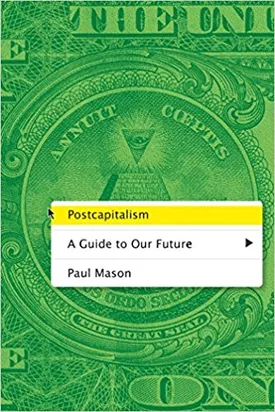Postcapitalism: A Guide to Our Future by Paul Mason
Postcapitalism: A Guide to Our Future, written by British journalist Paul Mason, takes readers on an exploration of the possibilities of the development of a new economic system. Mason asserts that the current free-market economic system is in terminal decline and that a new model, “postcapitalism,” is needed to ensure human progress and wellbeing.
Throughout Postcapitalism, Mason highlights a range of issues that support his core thesis. These include the impact of technology, the limitations of globalization, and decreasing levels of demand in a post-communist, post-industrial economy.
Mason argues that the current system of capitalism has had remarkable success in advancing technology and productivity, but contains built-in flaws that limit its ability to continue delivering prosperity for all. According to Mason, these flaws include market fragmentation, oversupply and information asymmetry. Mason states that, if left unchecked, these issues will undermine the current system of capitalism.
Mason believes that the increasing prevalence of automation, artificial intelligence, robotics, and other advanced technologies will cause further disruption in labor markets, triggering job losses and accelerating the use of alternative currency and systems of reward. He sees this disruption as a major symptom of the transition from an economy wrapped up with scarcity to an economy based on abundance.
Similarly, Mason looks at information technology’s disruption of existing business models and its impact on low-paid labor. He sees free-market economics as inadequate at solving these problems and states that new models are needed to ensure human progress and wellbeing. To this end, Mason offers a framework of an alternative economic system, “postcapitalism,” which he suggests may offer solutions to these challenges.
In Postcapitalism, Mason puts forward three key features of the emerging postcapitalism. These are a sharing economy, where there is an equal distribution of resources and a de-emphasis on ownership; a new way of setting prices and assessing value; and a more ethical relationship between employees and employers. Within this context, Mason claims that technology must be developed for the benefit of society and that the sharing economy should form the basis for a world defined by cooperation rather than competition.
Mason paints an optimistic but complex vision of the transition from capitalism to postcapitalism, making it clear that it must be managed over the course of decades rather than years. The transition, he adds, will be a difficult one as it involves fundamental changes to existing systems and techniques of economics, finance, and governance.
Overall, Postcapitalism offers an intriguing look at the possibilities of a new economic system. Mason suggests that good stewardship could allow humanity to successfully navigate the transition and create an economy that works to benefit all through cooperation and sharing. This vision of the future will likely inspire debate and thought amongst readers.

